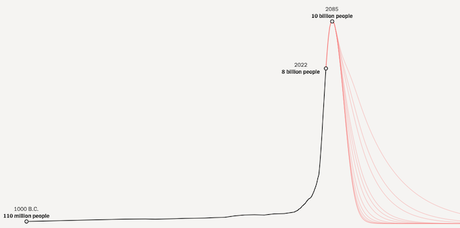
The following thought-provoking article is by economist Sara Kodesh in The New York Times: Here is just a part of what she wrote:
Most people now live in countries where two or fewer children are born for every two adults. If all people in the United States today lived through their reproductive years and had babies at an average pace, then it would add up to about 1.66 births per woman. In Europe, that number is 1.5; in East Asia, 1.2; in Latin America, 1.9. Any worldwide average of fewer than two children per two adults means our population shrinks and in the long run each new generation is smaller than the one before. If the world’s fertility rate were the same as in the United States today, then the global population would fall from a peak of around 10 billion to less than two billion about 300 years later, over perhaps 10 generations. And if family sizes remained small, we would continue declining.
What would happen as a consequence? Over the past 200 years, humanity’s population growth has gone hand in hand with profound advances in living standards and health: longer lives, healthier children, better education, shorter workweeks and many more improvements. Our period of progress began recently, bringing the discovery of antibiotics, the invention of electric lightbulbs, video calls with Grandma and the possibility of eradicating Guinea worm disease. In this short period, humanity has been large and growing. Economists who study growth and progress don’t think this is a coincidence. Innovations and discoveries are made by people. In a world with fewer people in it, the loss of so much human potential may threaten humanity’s continued path toward better lives.
Whenever low birthrates get public attention, chances are somebody is concerned about what it means for international competition, immigration or a government’s fiscal challenges over the coming decades as the population ages. But that’s thinking too small. A depopulating world is a big change that we all face together. It’s bigger than geopolitical advantage or government budgets. It’s much bigger than nationalistic worries over which country or culture might manage to eke out a population decline that’s a little bit slower than its neighbors’. . . .
It would be tempting to welcome depopulation as a boon to the environment. But the pace of depopulation will be too slow for our most pressing problems. It will not replace the need for urgent action on climate, land use, biodiversity, pollution and other environmental challenges. If the population hits around 10 billion people in the 2080s and then begins to decline, it might still exceed today’s eight billion after 2100. Population decline would come quickly, measured in generations, and yet arrive far too slowly to be more than a sideshow in the effort to save the planet. Work to decarbonize our economies and reform our land use and food systems must accelerate in this decade and the next, not start in the next century.
This isn’t a call to immediately remake our societies and economies in the service of birthrates. It’s a call to start conversations now, so that our response to low birthrates is a decision that is made with the best ideas from all of us. Kicking the can down the road will make choices more difficult for future generations. The economics and politics of a society in which the old outnumber the young will make it even harder to choose policies that support children.
If we wait, the less inclusive, less compassionate, less calm elements within our society and many societies worldwide may someday call depopulation a crisis and exploit it to suit their agendas — of inequality, nationalism, exclusion or control. Paying attention now would create an opportunity to lay out a path that would preserve freedom, share burdens, advance gender equity, value care work and avoid the disasters that happen when governments try to imposetheirwillonreproduction. . . .
Humanity needs a compassionate, factual and fair conversation about how to respond to depopulation and how to share the burdens of creating each future generation. The way to have that conversation is to start paying attention now.

